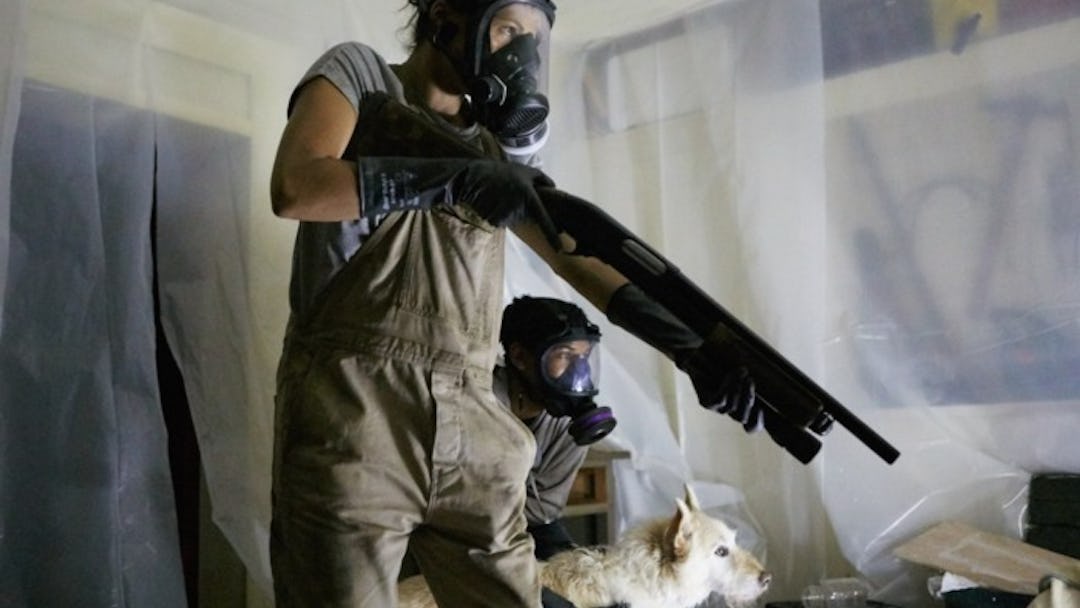Trey Edward Shults’s It Comes at Night opens with unsettlingly heavy breathing, and the garbled, underwater-sounding voice of a woman, who asks, repeatedly, “Can you hear me?”, before surrendering: “I love you Dad, I’m so sorry.” Then the father she’s addressing, his body riddled with sores and sickness, is wheeled out to the woods, where his son-in-law and grandson put a bullet in his head, throw him into a shallow grave, and set him ablaze. The title fills the screen. And that, friend, is how you start a movie.
It’s one of the great parachute drops in recent movie memory, narratively speaking – we’re coming into the story at a point by which people are already desperate, suspicious, and paranoid. They’re surrounded by death and lit by lanterns, living in boarded-up, locked-down homes, heavily armed. We’re never explicitly told what has happened in the world to create this crisis; Shults never even tells us exactly what was wrong with that old man in the pre-title sequence, except that he was “sick.” That’s all we get: “Are you sick?” “Are they sick?” “I think he’s sick.”
More than that, we’re left to fill in ourselves, which may be the most admirable quality of this riveting, rattling picture. Of course its characters wouldn’t talk about what happened to them, because they’d know – so Shults spares us the awkward expositional dialogue that does that job (you’ve heard it a million times, clumsy exchanges that begin with lines like “So where were you when you heard about the outbreak?”). But he also resists the urge to open with a breathless TV news montage or similar hack device. He simply leaves all that unsaid, because it’s more unsettling not to know exactly what happened – particularly at this tenuous moment in our culture. (At one point, early on, the couple at the story’s center has this exchange: “He’s gonna be fine, everything’s gonna be fine.” “You don’t honestly believe that.” How many variations of that conversation have you had in the past six months?)
And form follows function – the uncertainty of the construction bleeds into the story itself. Our focus is initially on one family, father-mother-child (played by Joel Edgerton, Carmen Ejogo, and Kelvin Harrison Jr.), until their home is broken into by another desperate father (Christopher Abbott). But he claims he didn’t know they were there, and was simply searching for water. He appeals to Edgerton’s paternal understanding: “If you want food, I have it. My family’s all that matters to me, I know you understand that… Help me and I can help you.” Edgerton is skeptical, understandably; we share his skepticism. What is Abbott really up to? Is he telling the truth? Again, Shults lets us draw our own conclusions, and later, when Edgerton seems to catch him in a half-truth, the filmmaker makes us sit in that moment with them, uncomfortably.
Shults broke through, and big, with last year’s Krisha, a film that took that old indie standby of the family gathering gone awry and gave it the unsettling rhythms of a psychological thriller. Much of that was accomplished via Drew Daniels’s dread-filled photography and Brian McOmber’s driving, relentless score; both are back, and well used, here. Maybe it was all the recent re-watching of Twin Peaks, but there seems something very Lynch-ian in the disturbing yet smooth way the camera moves, and how the sound design is less like an environment than an assault.
There are maybe too many nightmare sequences (and nightmares within nightmares), but the overall sense of fleeting reality fits snugly within the pervasive fever-dream tone and intensity. There’s a long stretch, towards the end, that masterfully captures the specific kind of fear that descends on a home when a kid is sick – but, obviously, on rather a deadlier scale. Then again, maybe that’s the genius of It Comes at Night’s ambiguity; its horror is widely applicable, and its title both makes a promise and asks a question (What is “it,” and why is it coming?) that it doesn’t answer. And, frankly, it doesn’t have to.
“It Comes at Night” is out Friday.
